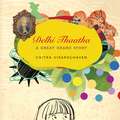The Murderer’s Mother: The India List
Autor Mahasweta Devi Traducere de Arunava Sinhaen Limba Engleză Hardback – 12 mar 2024
The Murderer’s Mother takes readers to the late 1970s in the Indian state of West Bengal, where the Communist Party–led Left Front has just been voted into power. It tells the story of Tapan, who has been installed as a gang leader by the most powerful man in the locality in order to kill “unwanted obstacles,” which he does, one after another. Tapan knows there is no other way he can earn a living, but at the same time, he is desperate to protect his family. He tries to stop petty crime and assaults on women, even as he protects his patron’s interests. Through the dissonance, he becomes both a feared and revered figure, but his patron’s game becomes clear: now the murderer, too, must be eliminated.
Din seria The India List
-
 Preț: 116.71 lei
Preț: 116.71 lei -
 Preț: 148.90 lei
Preț: 148.90 lei -
 Preț: 116.29 lei
Preț: 116.29 lei -
 Preț: 100.15 lei
Preț: 100.15 lei -
 Preț: 134.36 lei
Preț: 134.36 lei -
 Preț: 54.47 lei
Preț: 54.47 lei -
 Preț: 118.17 lei
Preț: 118.17 lei -
 Preț: 125.56 lei
Preț: 125.56 lei -
 Preț: 119.21 lei
Preț: 119.21 lei -
 Preț: 139.55 lei
Preț: 139.55 lei -
 Preț: 158.55 lei
Preț: 158.55 lei -
 Preț: 93.00 lei
Preț: 93.00 lei -
 Preț: 131.20 lei
Preț: 131.20 lei -
 Preț: 146.22 lei
Preț: 146.22 lei -
 Preț: 106.63 lei
Preț: 106.63 lei -
 Preț: 140.23 lei
Preț: 140.23 lei -
 Preț: 124.98 lei
Preț: 124.98 lei -
 Preț: 114.89 lei
Preț: 114.89 lei -
 Preț: 248.36 lei
Preț: 248.36 lei -
 Preț: 248.19 lei
Preț: 248.19 lei -
 Preț: 163.87 lei
Preț: 163.87 lei -
 Preț: 148.27 lei
Preț: 148.27 lei -
 Preț: 101.45 lei
Preț: 101.45 lei -
 Preț: 292.05 lei
Preț: 292.05 lei -
 Preț: 221.52 lei
Preț: 221.52 lei - 17%
 Preț: 122.21 lei
Preț: 122.21 lei - 16%
 Preț: 124.69 lei
Preț: 124.69 lei - 15%
 Preț: 99.47 lei
Preț: 99.47 lei - 12%
 Preț: 90.21 lei
Preț: 90.21 lei - 13%
 Preț: 103.90 lei
Preț: 103.90 lei - 18%
 Preț: 158.15 lei
Preț: 158.15 lei - 14%
 Preț: 115.27 lei
Preț: 115.27 lei - 19%
 Preț: 119.00 lei
Preț: 119.00 lei - 18%
 Preț: 157.29 lei
Preț: 157.29 lei - 15%
 Preț: 99.47 lei
Preț: 99.47 lei - 9%
 Preț: 626.60 lei
Preț: 626.60 lei -
 Preț: 95.92 lei
Preț: 95.92 lei -
 Preț: 80.77 lei
Preț: 80.77 lei -
 Preț: 133.76 lei
Preț: 133.76 lei -
 Preț: 80.77 lei
Preț: 80.77 lei -
 Preț: 80.77 lei
Preț: 80.77 lei -
 Preț: 80.77 lei
Preț: 80.77 lei -
 Preț: 133.76 lei
Preț: 133.76 lei -
 Preț: 80.77 lei
Preț: 80.77 lei -
 Preț: 148.90 lei
Preț: 148.90 lei -
 Preț: 120.25 lei
Preț: 120.25 lei
Preț: 157.12 lei
Nou
Puncte Express: 236
Preț estimativ în valută:
30.06€ • 31.39$ • 24.88£
30.06€ • 31.39$ • 24.88£
Carte disponibilă
Livrare economică 14-28 martie
Livrare express 27 februarie-05 martie pentru 31.12 lei
Preluare comenzi: 021 569.72.76
Specificații
ISBN-13: 9781803092324
ISBN-10: 1803092327
Pagini: 208
Dimensiuni: 152 x 229 x 23 mm
Greutate: 0.51 kg
Editura: Seagull Books
Colecția Seagull Books
Seria The India List
ISBN-10: 1803092327
Pagini: 208
Dimensiuni: 152 x 229 x 23 mm
Greutate: 0.51 kg
Editura: Seagull Books
Colecția Seagull Books
Seria The India List
Notă biografică
Mahasweta Devi (1926–2016) was one of India’s foremost literary figures from the late twentieth and early twenty-first centuries—a writer and social activist in equal right. Arunava Sinha is a prize-winning translator of classic, modern, and contemporary Bengali literature from India and Bangladesh. He is an associate professor of practice in the Creative Writing Department at Ashoka University, India, codirector of the Ashoka Centre for Translation, and the books editor of the online politics and culture magazine Scroll.in.
Recenzii
“This tale of familial bonds, societal unrest, and power obtained both legitimately and via violence is told tersely, often through rapid-fire dialogue. At times, the politically charged 1970s setting and focus on underworld activities parallels David Peace’s work. And the staccato rhythms of violence evoked by Devi’s prose in Sinha’s translation are often haunting.”
